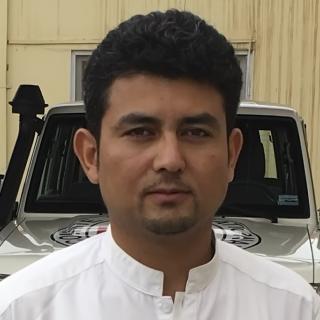Omar Ghulam Mortaza was born on 1 November 1989 in Balkh Province, northern Afghanistan. He graduated from Asadia High School, Mazar-i-Sharif, in 2004 and then completed a two-year diploma in Islamic theology at the city’s Asadia Institute. In early 2008 Omar began work as an announcer and producer of Sharia programmes for Lazha radio and television in Mazar-i-Sharif. He did this for almost two years before successfully studying for a bachelor’s degree in law and political science at Aria University, Mazar-i-Sharif (2009–2014). During this period Omar, who spoke Dari, Pashto, Arabic and English, also worked as a translator and interpreter with the International Security Assistance Force and MPRI, a private military contractor.
From March to December 2013, Omar was employed as a field protection officer with the Danish Refugee Council, based in their Mazar-i-Sharif office. His main task was to monitor the impact of aid distributions and identify any shortcomings. The following year Omar started a new role in the city, working as a civic educator with the independent election commission.
In October 2014 Omar joined the ICRC’s Mazar-i-Sharif subdelegation as a communication field officer. His job primarily involved ensuring that the ICRC’s neutral, impartial and independent humanitarian mission was understood – and accepted – by communities and armed groups. In getting out this message, Omar worked independently as well as alongside counterparts in the Afghan Red Crescent Society.
His professionalism and dedication were apparent right from the start. Omar was eager to learn and improve, equally happy taking the lead or helping others. And he was a pleasure to work with: open to others and new ideas, always with a warm smile. Outside of work, he enjoyed playing the harmonium, reading poetry, and playing volleyball and football.
On 8 February 2017, Omar was part of an ICRC convoy delivering livestock feed when it was attacked by unidentified armed men near Sheberghan, Jawzjan Province, northern Afghanistan. Omar, who was 27, was killed along with five other colleagues: Najib Sahebzada, field officer; Khalid Jan, economic security field officer; Ghulam Rasoul, driver; Ghulam Maqsoud, driver; and Sayed Shah Agha, driver. During the same incident, two other colleagues were abducted; they were held captive for seven months.
It is one of the worst tragedies in the history of the ICRC.
Speaking after the killings, Director of Operations Dominik Stillhart condemned what he described as a “horrific, senseless act” that had devastated so many lives and shaken the ICRC to its core.
“Alongside the profound sorrow that I feel, I am also filled with anger and outrage that someone would so brutally take the lives of our colleagues – colleagues who were dedicated to helping others. Nothing can justify their murder,” he said.
